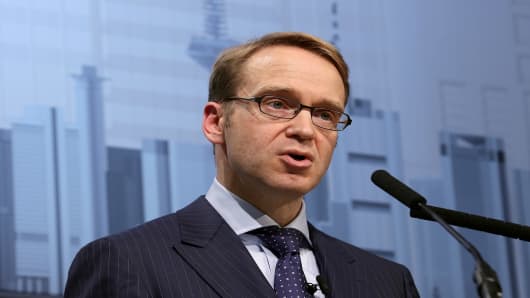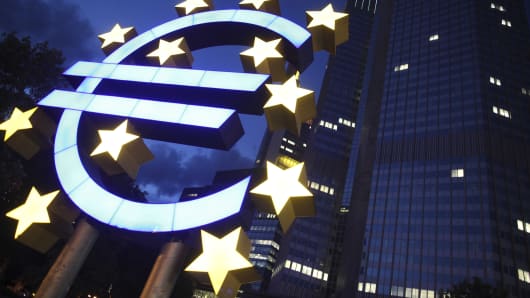The eurohad its biggest one-day fall in almost a year on Wednesday after a prominent European Central Bank (ECB) official said there was a possibility of an interest rate cut in the euro zone and analysts tell CNBC there's plenty of reason to take him seriously.
The ECB could lower interest rates further if the economic data warrant it, ECB Governing Council member and Bundesbank President Jens Weidmann was quoted by the Wall Street Journal as saying on Wednesday in remarks that knocked the euro more than 1 percent lower to $1.30.
The single currency was only a touch firmer in early Asia trade on Thursday, nursing its heavy overnight falls.
"Markets were uncertain about the scope for interest rate cuts in the euro zone and even though they had been hinted at, it didn't seem that any rate cuts were in the pipeline," said Mitul Kotecha, the head of global currency research at Credit Agricole in Hong Kong. "Now that they [ECB officials] are talking about it directly suggests there is a sense of urgency."
The ECB left its key interest rate unchanged at a record low of 0.75 percent at its policy meeting in early April. The central bank said it expected a gradual economic recovery later this year and would monitor economic data closely.
The latest numbers out of the euro zone do not make good reading: data on Tuesday showed the ZEW economic sentiment index for the euro zone fell more-than-expected to 24.9 in March from 33.4 in February, while on Wednesday the Association of European Carmakers reported that new car sales in the region fell 10 percent in the first quarter from the previous one.
Also on Wednesday, Germany's economic institutes cut their growth forecasts for 2013 to 0.8 percent from an estimate of 1 percent made in October, Reuters reported.
"Europe's economy is not out of the woods yet, so the ECB is keeping all its policy options on the table and that is the sensible way to go about it, especially if they are concerned about German growth slowing," said Vishnu Varathan, market economist at Mizuho Corporate Bank in Singapore. "Look at the Q1 car sales data – it was just quite abysmal."
(Read More: Reinhart-Rogoff Error Sparks Austerity Debate)




